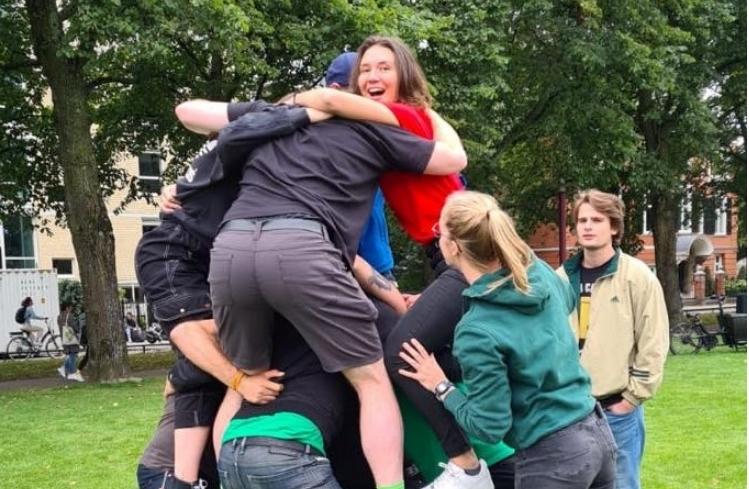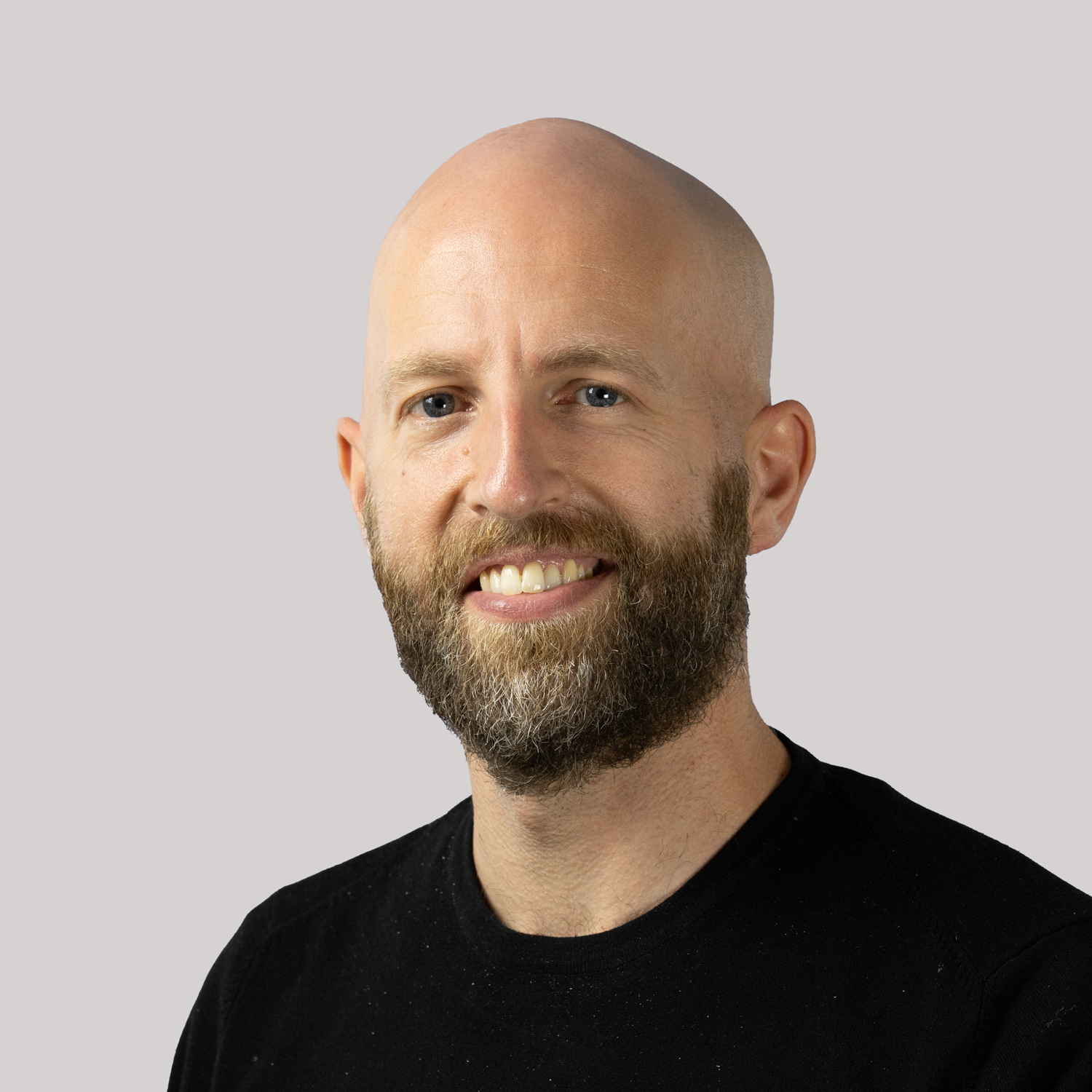How I Survived My First Semester at ESP…
and You Can Too
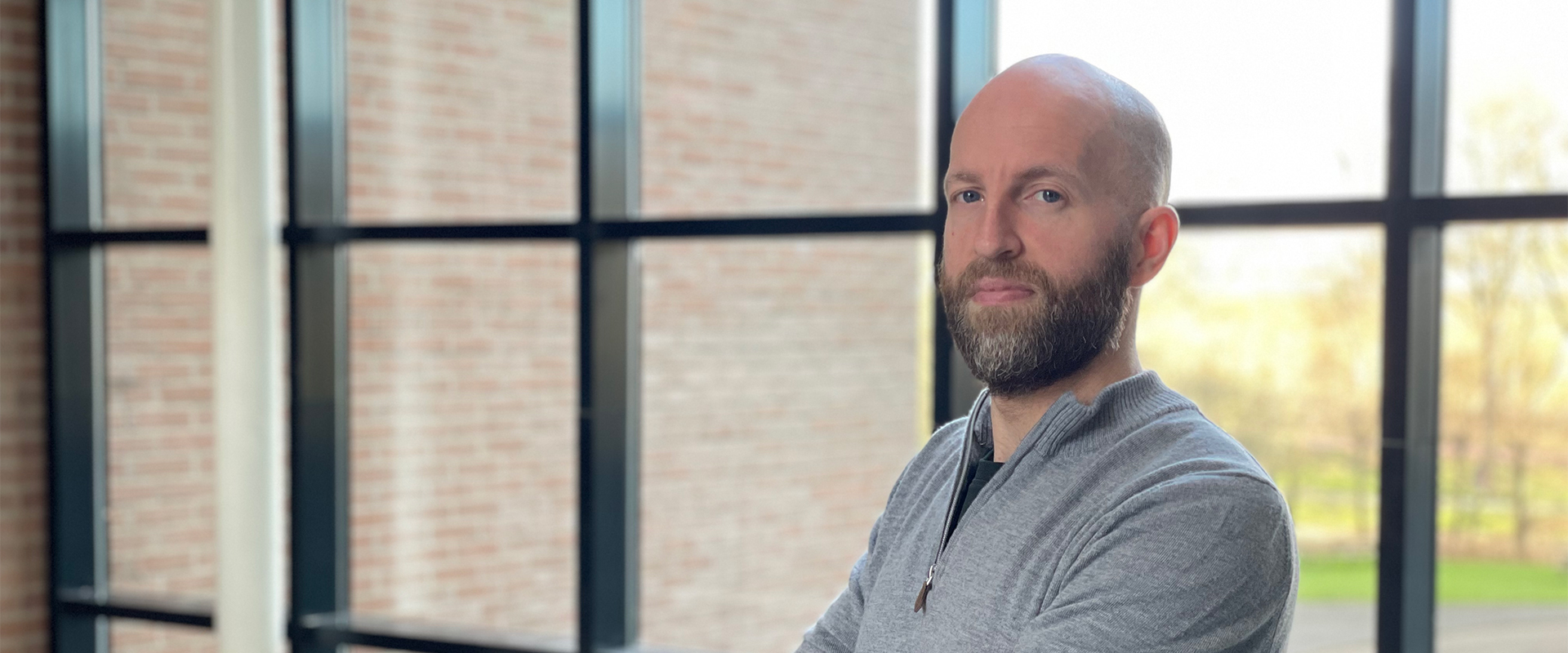
How I Survived My First Semester at ESP, and You Can Too
So you’ve attended the ESP open day, done your research, followed the application process and been selected. Congrats! Wasn’t that online entrance exam fun, with paralysing biomechanics questions that you totally guessed at least half of?
And what would I know about it you might rightly enquire? Well, I’ve recently finished my first semester at ESP, so the triumphs and traumas are all still pretty fresh. Curious to know what your first semester might be like? Read on for an up close and personal account of all the stuff you won’t find on the official pages …
The stuff dreams are made of

ESPriorities
In preparation for the big move to Amsterdam you’ve bought some sweet new outfits, hugged your forever indifferent cat goodbye, and sold all those ‘sure thing’ NFTs at thankfully only a mediocre loss. Now it’s time to think about where you’re going to sleep when you arrive.
Housing. Priority number one – because studying on your hostel bunk bed in the dim light of your iPhone is not the stuff dreams are made of. I’m lucky – having friends in Utrecht (a major city close to the school) who also have a vacant studio at their place means that crashing with them for a while is a no-brainer.
It’s about two weeks before ESP’s Introduction Week when I land at Schiphol airport, and I start ticking off essential life admin tasks such as bank account, phone number, and locating the best pint of Guinness in the city. As I should probably limit how much I test the goodwill of my friends, I start getting in touch with several other students in the ESP Facebook group to see if we can find a place to live together. Unfortunately it’s a fruitless experience as a string of potential housemates fail to reply or just disappear. Many others have applied for the housing offered through the school – it’s a convenient option, but you only get a one year contract. Having a place to stay with friends means I can survey the options locally with less urgency and more flexibility.
I read over previous ESP blog article The Truth About Student Housing several times to gather some other ideas on how to solve the accommodation problem, and pay a small subscription fee to room hunting website Kamernet. Precisely zero of the options appeal to my admittedly very fussy tastes.
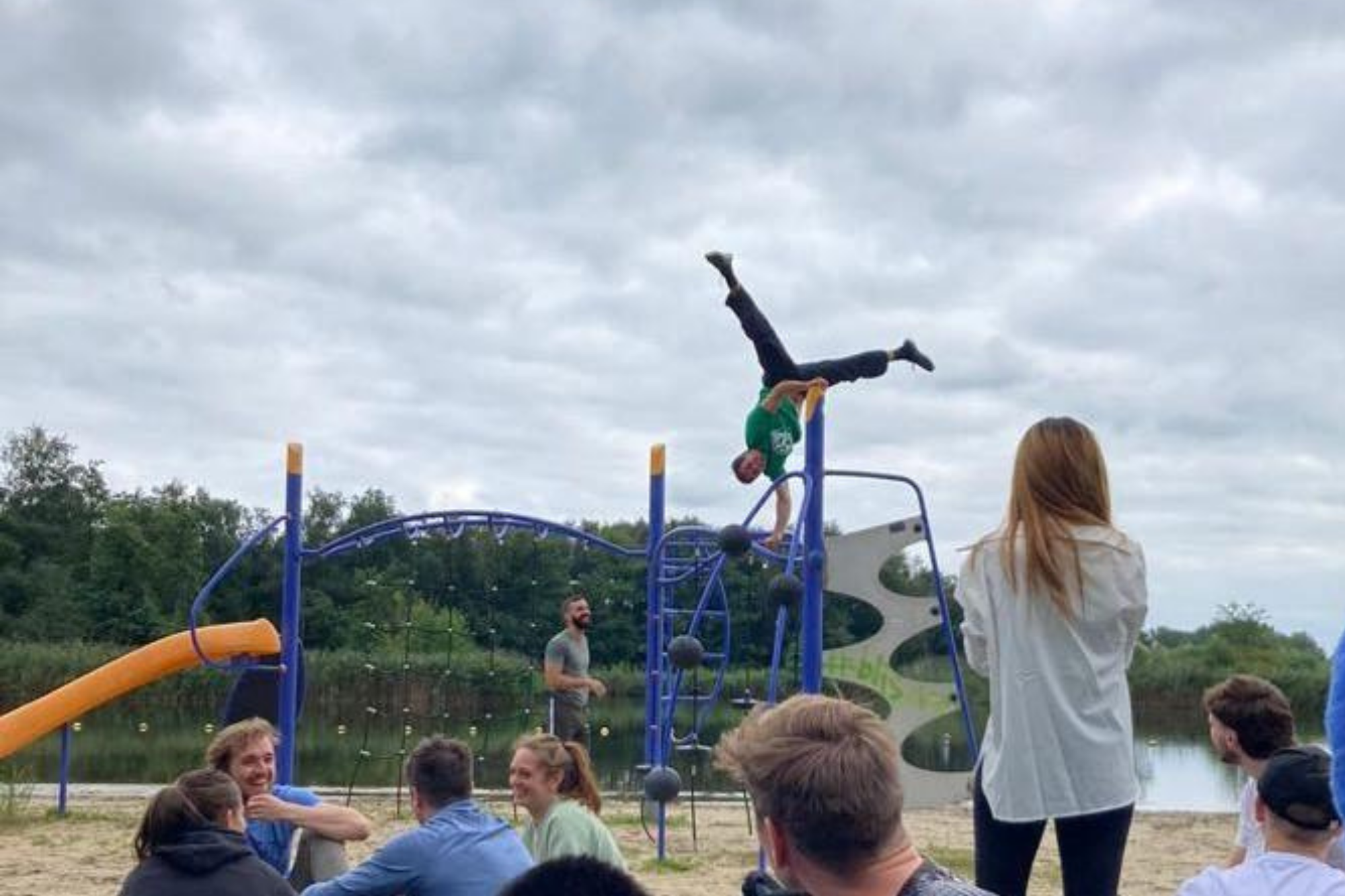
Balance – Photo by Clarisse Dela
Introduction Week
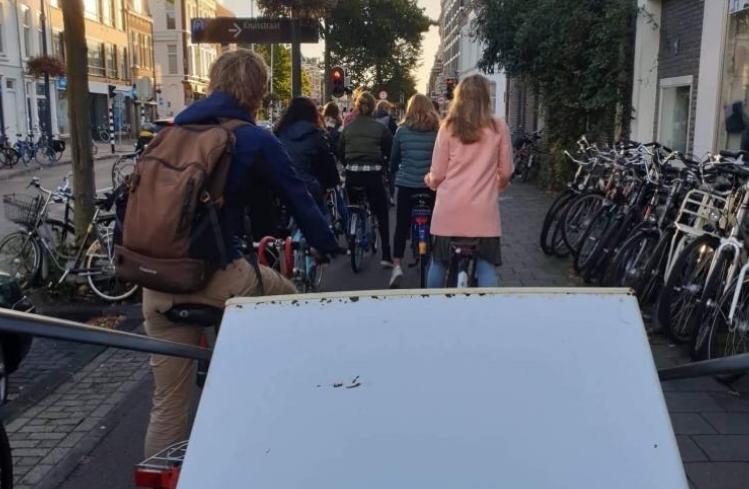
Enjoy your summer, because once you get on this train, it never stops
To new beginnings!
The programme for this first week is packed and varied, with official events and talks during the day, and social events organised by some third year students in the afternoons or evenings. The week is absolutely exhausting as I balance formal things like preparing questions for meeting a spinal cord injury patient in the morning, with informal things like sinking as many late night pints of Guinness as I can before my darts aim disintegrates completely. By the end of the week I have absolutely loved it, and fold myself pathetically into a warm bed for an epic sleep.
We also come to learn that pretty much all theory lectures will be online, with practical classes of course remaining on campus. This meets a mixed reaction. I hear some people talk about “not moving to Amsterdam to study online”, but soon we discover that actually it is a pretty great way to do things, as we can attend the lectures from wherever we want, and I end up attending most of them while sitting somewhere in the school with some classmates anyway. Naturally, anything pre-10am is attended from within a 10 foot radius of my bed. As the semester stretches onwards the theory subjects also begin to give way to more practical subjects, and we end up being physically present in classes almost every weekday.
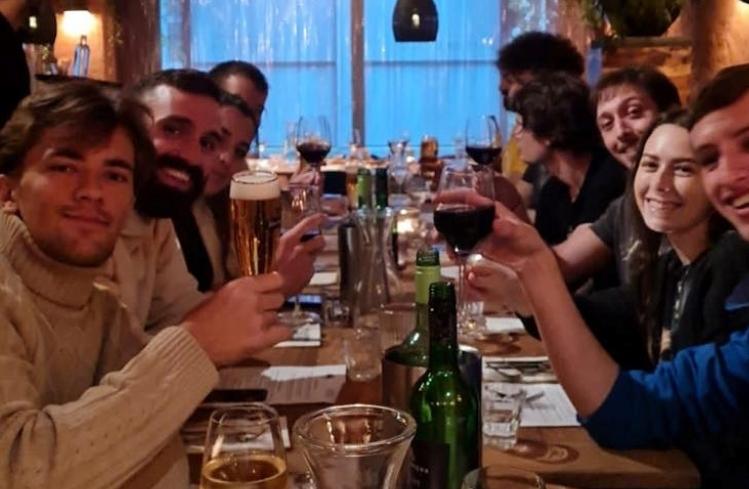
Dinner – Photo by Leon Knoche
intensity of ESP
One challenge with the apartment that I’m not used to, and is common here – it is completely unfurnished, which necessitates some creative approaches to furnishing, given my student budget. I find a fridge for free on Facebook group ‘gratis op te halen’, and cycling it across Utrecht in rush hour bike traffic proves to be a memorable challenge. With help from my friends I also succeed in locating a large table and a double bed for free on other similar websites, and pick up a few more essentials at IKEA which is just a 15 minute walk away – very handy for furnishing your place with exotic looking lamps and the same bedside table owned by 80% of Europe.
You’ve probably heard a lot about the intensity of the program; I can confirm, it is intense. Some weeks more so, and some weeks less.
About 6 weeks in the workload starts feeling particularly heavy, as the variety of things to prepare for and attend seems to approach a peak. We juggle clinical sessions (seeing real patients in our class group under the supervision of an experienced physical therapist), tackle an exam almost every week, and try to absorb many hours of classes online and in person.
Thankfully there’s a strong sense of being in the trenches together with fellow library warriors, so that and the extremely cheap vending machine coffee (and sometimes a less cheap but more delicious coffee from the on-site café) helps maintain our sanity. We even manage the occasional card game at De Proefzaak, a nearby bar where they brew their own beer, alleviating a little more exam pressure. Weekend study groups form to help prepare for exams, a social way to test and share knowledge just before an exam takes place.
Try to absorb many hours of classes online and in person.
November season? exams season!
Late November – it’s almost time for the big Anatomy exam. It’s been an exhausting few weeks, and one particular morning I feel like I’m in a mental fog. I sit in an 8.30am Biomechanics lecture, poorly slept and staring blankly at a stick man, trying vainly to figure out where his general centre of mass is. You might as well ask me for my opinion on the reproductive cycle of sloths, or how many Kardashians there are. I have absolutely no idea, nor the ability to process the information were it offered to me.
But with one last big push of learning all the tiny muscles of the hands and feet, it all comes together nicely in the end. Celebrations are had, beers are pong’d, and Uber drivers are summoned. The next big worry on everyone’s mind is the practical exams – it’s all well and good sitting at a computer mentally running over all the clever mnemonics you came up with, but actually being tested on your practical skills live and under pressure? That’s a whole different enchilada.
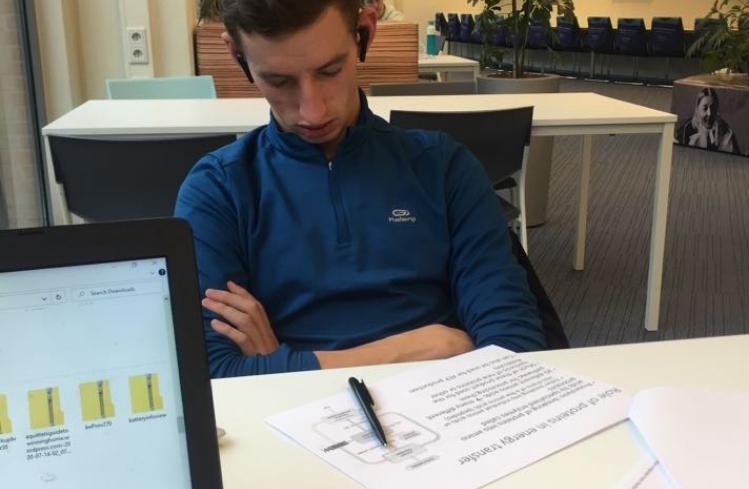
The end is near?
With another practical exam (Assessment) ticked off the following week it’s finally time to fly back to Dublin for Christmas break, and my Guinness does it feel good to get home and not think about training principles and internal torques for a few precious days. I feebly attempt a little study a couple of times but quickly decide that I’ve earned a break, and give up on any usage of my brain while at home.
Early January though and it’s back to Amsterdam for the last few practical exams, which will also bring the first semester to a close. Somehow it always feel like things have gone badly in the exam; the examiners have to remain neutral so sometimes it feels like they’re just staring at you and wondering how you could do something so dumb, when actually you’ve probably done just the right thing, but they can’t indicate that!
Are there some moments during these last exams that I would rather forget? Sure, such as swearing loudly on camera while pressing my hands to my head, thinking I had made a terrible mistake – not really a shining example of a future physio. But in the end, all the many hours of preparation, the repeated reviewing of preparatory videos, the years of previous interest in physiotherapy – it all pays off nicely in to a respectable set of grades and a gratifying first semester.
Are grades everything? Of course not – you can get more modest grades and end up a more accomplished physio than your peers in the real world; it’s a long game, and this is just the beginning. So take the time to stop and enjoy it – physiotherapy is as much about relating well to people as it is knowing how to assess and treat them, so poke your head up out of the books regularly – and stay relatable!
Tower – Photo by Alex Korakaki
